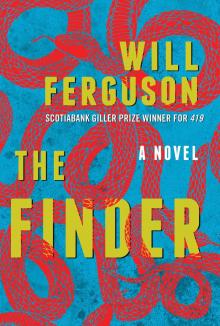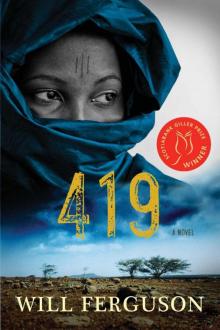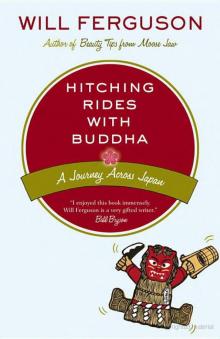- Home
- Will Ferguson
419 Page 2
419 Read online
Page 2
I'm asking you—
Who is dey mugu now?
CHAPTER 5
Members of the collision reconstruction team had already gone through by the time Officer Brisebois arrived. They'd laid down tent cards for the GPS survey to follow, and under the glare of floodlights, their breath formed winter haloes.
He checked in with them first. "Colin. Greg."
The older constable, Colin, looked up, grinned. "Sergeant Brisebois. Nice of you to show up."
They never referred to him as Matthew. It was one of their few concessions to his higher rank.
Brisebois had been on call. "Pager was in my jacket. Jacket was in the coat check."
"Coat check?"
"I was at a show. Had to change in the car, if that makes you feel better."
He hoped that would be the end of it, but of course it wasn't.
"You can't sneak out of a movie? Flash your badge, demand a refund?"
"Not that kind of show."
Greg, the younger constable, laughed. "Don't tell me you were whooping it up at a peeler bar while we were out here in the cold."
"No, not that kind of show either. "
Sergeant Matthew Brisebois had been at the city ballet's annual production of Swan Lake, his wife's ticket on the empty seat beside him. He sighed. Might as well get it over with.
"I was at the ballet. The wife and I, we bought season passes.
Well, she did. For the both of us. Anyway, I had the tickets, seemed a waste."
"The ballet? What, like the Nutcracker?"
"No, not the Nutcracker."
"The nutcracker?" said the younger constable. "I think I dated her.""Hell," said Colin. "I think I was married to her at one point."
He looked at the cup of coffee curling steam in Brisebois's hand.
"See you had time to stop by for a cuppa Tim's, though. We're investigators, we notice things like that."
"You brought some for us, too, I'm assuming?" asked Greg.
"I did. But I dropped it on the way down." Brisebois took a deep and intentionally satisfying drink from the cup. "So," he said.
"What do we have?"
"Pontiac Olds. Came over the hill and then left the road—down there. Hit some ice from the looks of it. Driver missed the bridge, went over the edge of the embankment. Flipped, end over end, two, maybe three times."
"Oldsmobile?" said Brisebois. "That's a lot of metal. They don't even make those anymore; it's been, what, ten years at least. So... Male. Senior citizen. Somebody's grandpa. Am I right?"
Colin nodded. "Died on scene. He's still down there. I don't know how they're going to get him out."
"Was he belted?"
"Nope."
"You run the plates yet?"
"We did. Nothing on the vehicle. Not even a speeding ticket."
"And the driver?" asked Brisebois. "You run him through PIMS?" This was the police department's updated central information system. Any previous contact with police, whether through an arrest or as a witness or in a report of any kind, from domestic disputes to noise disturbances, and the driver's name and background would pop up.
"Nothing much. He called in a complaint a couple of weeks ago about someone hanging around outside his home in the middle of the night. Turned out it was a bush."
A classic old-man complaint. You kids get off my lawn!
Snow was filtering down, phantom flakes melting on contact.
Under the silent flash-and-throb of police lights, Brisebois and the senior constable walked over to where the car had careered off course, plummeting over the side. Tire tracks: leading off the asphalt, onto packed snow, and then—disappearing, into nothingness.
The fire department had parked a light truck on the bridge, and the spotlight was trained on the upside-down vehicle leaning drunkenly against a stand of poplar trees at the bottom of the embankment. Brisebois could see where the Olds had first hit, nose in, and then pivoted, rolling end over end. It wasn't like in the movies, where cars soared upward with a certain cinematic flair, sent off hidden ramps with their motors often as not removed ahead of time. In the real world, cars were front-heavy, and when one left the road it dropped—like a stone. An Oldsmobile? That would have been like driving a tank off the side of a cliff.
The touchdown point was a wet black bruise in the snow, shards of debris fanning outward. "Let me ask you something," Brisebois said. "From up here, where the vehicle first leaves the embankment, to where it hit, down there—from liftoff to touchdown, so to speak. That's more than a car length, wouldn't you say?"
"Yup."
They both knew what that meant: all four wheels had left the ground. The car had been airborne.
Brisebois looked up at the road that curved toward them.
"Would be hard to work up a decent speed from there. Any sign of braking?"
"Not here, where it went off the road. But there's something farther back that you should take a look at. Something strange."
They headed up, toward the flashing lights of a police cruiser that blocked off the road at the crest of the hill.
"We found these when we first walked the scene," Colin said.
There on the asphalt, and already flagged with a numbered tent card—a second set of tire marks.
Brisebois crouched down, ran his flashlight along them. "That's a hell of a skid."
The other officer nodded. "We'll pull the drag sled, find the surface friction, calculate the speed. But just from looking at it, I can tell you, whoever left these marks was travelling fast and braking hard."
Brisebois looked down toward the bridge. "So... What do you figure? Same guy?"
"Maybe. But the tracks don't line up."
He was right. The tracks that ran off the embankment, missing the guardrail, were at a different angle than the tire marks higher up. "And if he did brake halfway down, that would've made it even harder to get up the speed he'd need to become airborne."
Brisebois ran the beam of his flashlight along the skid mark.
"Whoever it was, they came to a complete stop."
Beyond the skid was a faint dusting of grit. This was part of the snowplow effect of a braking tire, pushing pebbles and dirt forward into its path. When a vehicle came to a hard stop, then rolled ahead, through its own debris... "We've got tread prints?"
"We do. Good ones, too. Greg already logged them, took pictures. They're faint, but very clear. Here's the weird part, though. Up ahead?" Colin angled his light low across the asphalt. "Do y'see?" The tread marks curved sharply to the left.
"The driver turned around."
"Whoever it was would have had to crank the wheel hard to make that," said Colin.
"So," said Brisebois. "This second driver comes flying over the hill, sees the first vehicle go over the side, brakes hard to a full stop, then pulls a sharp U-turn. Was the second car chasing the first one? Or did it turn around when it saw the accident, to get help?""Maybe."
"Who called it in?"
"The warehouse, over there." Colin pointed across the hill, to a distant line of docking bays under pooled light and falling snow.
"Truck drivers, unloading their long hauls late at night."
"They saw it?"
"Heard it. We've got an officer over there taking statements. Don't imagine it will be much help, though. It was dark and they're far away."
Brisebois looked again from the skid mark down to the other set of tracks. The first driver: falls asleep, or has been drinking, or maybe suffers cardiac arrest, leaves the road, missing the guardrail and plunging over the side. A second driver: sees this happen, hits the brakes, comes to a stop, turns his or her vehicle around... and leaves the scene. Why? Panicked? Maybe this second driver'd been drinking too. Or was driving without a licence, didn't want to call the cops. Or was there something else going on here?
The flatbed had arrived. Brisebois could hear its backup warnings beeping. Once the fire department got the driver's body out, the flatbed would haul the wreck to a recons
truction facility where they'd check the brake lines for tampering, begin the process of crossing items off a list, narrowing the possibilities.
Brisebois finished the last of his coffee. "I'll let you guys finish up. Measure the marks, calculate speed, all that fun stuff. I'll notify next of kin. Do you have an address?"
The other officer, Greg, grinned. "I did, but I dropped it."
"Guess I'll just look it up myself then," said Brisebois with a weary smile. And then, as he was about to leave: "Did you check for scrub marks? Down by the bridge, where the vehicle left the road, went over the side?"
"We did."
"And?"
"Just gets stranger and stranger."
CHAPTER 6
A fan stirred the humidity, raising a breath of goosebumps across her skin. Her hair, still damp from her brief foray outside, formed unintentional ringlets, wet against her skin.
He had her passport.
Inspector Ribadu—"Please, call me David," he'd said, waving her to a seat across from his desk—was turning over the blank pages as though they told a story. And maybe they did.
Above his desk, on the wall behind, the national motto: Unity, Faith, Peace & Progress.
"All three in short supply," he joked, when he noticed her looking at it.
"Four," she said softly. She couldn't help it; when you see a discrepancy, you flag it. Four, not three.
He turned, looked at the motto as though for the first time.
"Oh no, madam. Only three are in short supply. This is Nigeria.
We have plenty of faith."
He found the stamp he was looking for in her passport, and the stapled pages that were attached.
"A letter of invitation from the Nigerian consulate. Good, good.
A mere formality, of course, as visitors are always most welcome.
Often I say, why does someone need to be invited? In Nigeria, if a visitor comes to our door, even in the midst of night, we must welcome them in."
He smiled. Muscles bunching in his cheeks.
She sat across from him, clutching her carry-on bag and a sheaf of medical papers.
"I have my return ticket, and all the necessary inoculations." She slid the papers across. Her left arm still ached from the injections.
The inspector laughed, a low chuckle. "That's for your country to worry about, when you return." He rose, came around the desk toward her, and for a moment she thought they were done, but no.
He was looking at her carry-on bag. "Sorry-o. May I?"
She swallowed. "Of course."
He took everything out one item at a time, laying them on his desk. When he came to the Virgin in-flight magazine, she felt her throat constrict. It was her good fortune, however, that the inspector had already seen this issue. He gave it only a cursory glance. "Excellent article about the wine country in France, yes?"
He placed the magazine on his desk alongside her rumpled folds of clothes and assorted toiletries.
He surveyed the selection in front of him. "Only this?"
"I'm just here for two nights. I fly out again on Sunday. It's all there in the letter." She had explained this to the clerk at the consulate, how she'd won a ticket to anywhere, had always dreamed of Africa. She'd filled in all the necessary forms, had paid the necessary fees, had received the letter of invitation, as required, which Customs and Immigration had duly stamped.
Inspector Ribadu smiled at her. "Sightseeing, is it?"
She nodded.
"The Yankari Highlands, I imagine? To see the water buffaloes and baboons? Perhaps luck will smile and you will catch sight of some lions, very rare. This is West Africa, madam. We don't have the big-game safaris you might see elsewhere. But we do still have a few lions left, yes. And some hyenas. It's funny, madam. Visitors so often worry about lions, but it's the hyenas of this world one needs to watch for. They hunt in packs, hyenas. Lions hunt in prides. I like that," he said. "Calling them prides. No one ever speaks about a ‘pride of hyenas.' Have you noticed that?"
"I hadn't, no."
"Wikki Warm Springs. Those are in Yankari as well. Very beautiful. I imagine you will be visiting Wikki during your stay?"
"I'm hoping to, yes."
"Ah, but that would be impossible. The Yankari Highlands are very remote. Much too far for the short time you have. Indeed, madam, I'm surprised you didn't know this before you came. With the short time you have available to you, you'll be lucky to get out of Lagos."
Lucky to get out of Lagos. Was that a veiled threat? She slid her hand into her skirt pocket. She had a fold of naira bills within easy reach, enough for an emergency but probably not enough for a bribe. But farther down, tightly folded in a small pouch she'd sewn into the lining of her skirt pocket: an American $100 bill.
The international currency. "Corruption at Murtala Muhammed Airport in Lagos has been brought under control. Do not, under any circumstances, offer bribes to airport officials." Every travel advisory had stressed this, but is that what the inspector was fishing for? A payoff? She extracted the folded bill, slipped it into the palm of her hand.
"Such a shame," he said. "You have a visa valid for thirty days, but are only staying two nights. No husband?"
"No husband."
"So... who supports you? You have a father, yes?"
"I support me."
"I see. In what line of work, madam?"
"I'm an editor—a copy editor. Grammar. Fact-checking.
Indexes. That sort of thing."
"I see. A journalist, then? Here to do another story on the Heartbreak of Africa?"
"I'm not here on any kind of assignment. I'm here as a tourist."
"But you do work for magazines?" He picked up the in-flight publication. "Perhaps you are only pretending to be a tourist, to avoid the paperwork required of journalists? The visas and such."
"No!" she said, a little too quickly. "No, not magazines."
She saw him catch this, her sharp reaction, but he didn't connect the flash of panic to the magazine he was holding in his hand. He put it to one side absentmindedly.
"Newspapers, then?"
"Books, mainly. Biographies. It's—it's nothing."
"How can something be nothing? I suspect you are being too modest, madam. We all have our stories to tell, don't we? We all have our secrets. Sometimes the smallest detail can be of the utmost importance, don't you think?" He looked again at her belongings neatly arranged on his desk, the tampons and T-shirts, the tightly rolled socks. "No camera," he said.
"Sorry?"
"No camera. A tourist with no camera. When I see such a thing, it... concerns me."
"My cellphone," she said. "It takes pictures."
"You came all the way to Africa to take photographs with a phone?"
"I was—I was going to buy a camera when I got to the hotel."
He turned back to the landing form that had been stapled into her passport. "Ah, yes. The Ambassador Hotel in Ikeja. It's very near here. You can see it from the airport. Splendid accommodations. I'm sure they will have shops which sell cameras and such, so that you may"—he searched for the right word—"immortalize your time here in Lagos." His smile softened, and he began placing her belongings back into her bag, starting with the in-flight magazine, flat along the bottom.
He'd missed it.
No explosives, no narcotics, no stash of money. It was something more combustible than that. And he'd missed it.
She quietly pushed the folded $100 bill back into her pocket pouch, unnoticed, as he finished zipping up her carry-on.
"There you go, madam. Enjoy your stay."
"Thank you. I will." She gathered up her bag, stuffed her medical papers into the side of her bag, hurried to leave.
"Madam?"
"Yes?"
"One last thing. Tell me, you hear of this problem we have in Nigeria? With 419?"
CHAPTER 7
This is what her father had told her as he was leaving. This is what Laura's dad had said the last time they ever
met. "You, I love."
Why would he say that?
"You, I love." She hadn't heard that turn of phrase in years.

 The Finder
The Finder 419
419 Hitching Rides with Buddha: A Journey Across Japan
Hitching Rides with Buddha: A Journey Across Japan